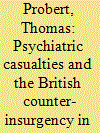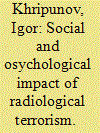| Srl | Item |
| 1 |
ID:
184185


|
|
|
|
|
| Summary/Abstract |
The psychiatric cost of Britain’s post-war counter-insurgency campaigns have gone largely un-investigated. Focusing on the Malayan Emergency, this article will show that counter-insurgency operations were sufficiently intense to produce what were conceptualised as cases of mild psychoneurosis. These conditions were managed using convalescence and simple psychotherapy. Managing these conditions in this way risked leaving more serious conditions untreated and meant recorded cases of psychoneurosis were kept artificially low. That the stresses of the counter-insurgency in Malaya were reproduced elsewhere suggests there was a wider psychiatric cost of Britain’s post-war period of decolonisation.
|
|
|
|
|
|
|
|
|
|
|
|
|
|
|
|
| 2 |
ID:
152323


|
|
|
|
|
| Summary/Abstract |
U.S. service women were exposed to more combat-related trauma in recent wars compared to prior conflicts and consequently faced an increased risk of trauma-related mental health outcomes. In this study, we examined gender by race differences in self-reported post-traumatic stress disorder (PTSD) symptoms and clinician diagnoses in a large sample of U.S. Black and White service men and women returning from Iraq and Afghanistan, to determine whether women overall and Black women in particular are at an increased risk of PTSD compared to Black and White men. Using three PTSD measures—two symptom-based measures assessed at different times and one diagnosis measure—we found more traumatic combat exposures were associated with higher PTSD risk for service women compared to service men, but there was no additional increase in risk of PTSD for Black females.
|
|
|
|
|
|
|
|
|
|
|
|
|
|
|
|
| 3 |
ID:
075779


|
|
|
|
|
| Publication |
2006.
|
| Summary/Abstract |
The July 2005 terrorist attacks in London demonstrated the resilience of Western society in the face of low-level conventional terrorism. But the psychological damage from the London bombings would likely pale next to the severe, unpredictable, long-lasting effects of a radiological attack. One unique hazard of radiation exposure beyond the obvious physiological effects is that it is colorless, odorless, and tasteless, making it difficult for ordinary citizens to evaluate, quantify, and rationally understand the dangers confronting them. Radiological weapons stand out among the tools available to terrorists for their capacity to inflict far-reaching psychological damage to civilian populaces well beyond the immediate victims. A possible solution to mitigate the psychological consequences is to build a "resilience culture," an interlocking set of beliefs, attitudes, approaches, and behaviors that help people fare better in any disaster or extraordinary circumstance. The "all-hazards approach," which emphasizes the identifiable similarities among the "disaster triad"-that is, natural, accidentally man-made, and intentionally man-made disasters-extends to acts of terrorism and could help demystify the fears associated with radiological terrorist weapons.
|
|
|
|
|
|
|
|
|
|
|
|
|
|
|
|
| 4 |
ID:
144744


|
|
|
|
|
| Summary/Abstract |
The embellishment of a warrior biography has a long history but examples of veteran elaboration of traumatic experience have become increasingly apparent. Although legislative change in the UK has removed the penalties for fabrication and a progressive decline in the military footprint may have increased the likelihood of such false trauma narratives, a paradigm shift in explanations for mental illness underpins this phenomenon. The recognition of post-traumatic stress disorder (PTSD) in 1980, followed by studies to identify risk factors, led to a greater appreciation of psychological vulnerability. As a result, the use of shame to discourage acts formerly labelled as “cowardly” or “lacking in morale fibre” is no longer considered appropriate. Recent conflicts in Iraq and Afghanistan generated popular sympathy for service personnel, whilst media focus on PTSD has led the UK public to believe that most veterans have been traumatised by their tours of duty.
|
|
|
|
|
|
|
|
|
|
|
|
|
|
|
|